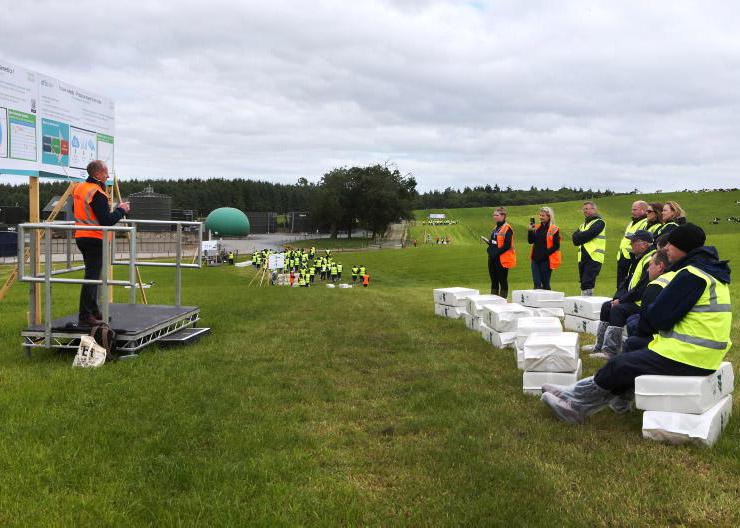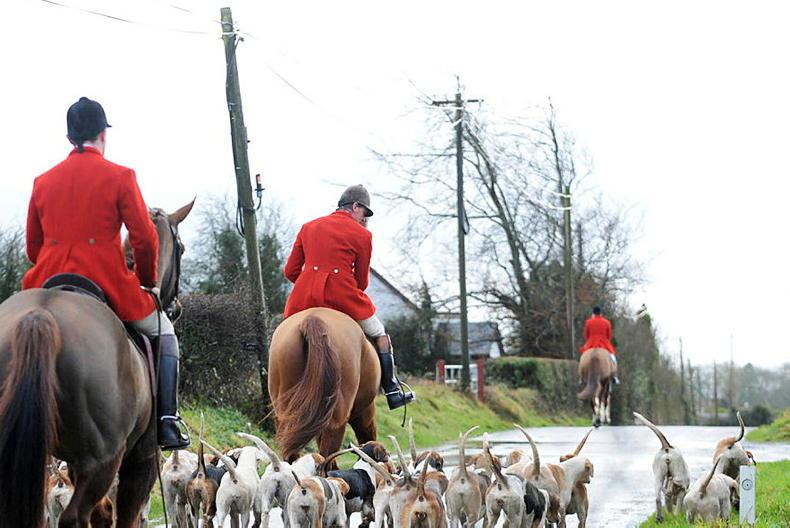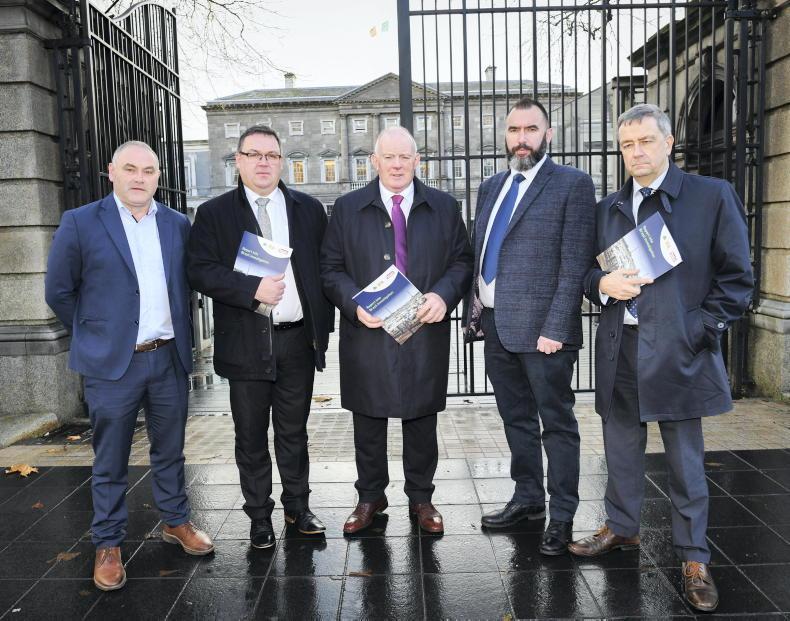Ireland should increase its production of bovine dairy and meat to have “a net benefit on global emissions”, according to chair of Moonsyst International Desmond Savage.
Savage told TD and senator members of the Oireachtas Agriculture Committee that if Ireland does not “serve the increasing global demand” for dairy and beef, other countries will.
He said the animal welfare and sustainability credentials of these countries “lags Ireland’s record”.
The chair of Moonsyst International, a company which makes cattle monitoring systems including for emissions, said that the current metrics under consideration for addressing agriculture’s environmental impact, such as biogenic methene reduction or national herd size reductions, are wrong.
He made his comments in Leinster House on Thursday.
Car comparison
Savage described the progress that can be made in reducing methane emissions from cattle by comparing them with cars.
He said: “Cattle, like cars, can vary extensively. However, not all cars are treated equally when it comes to greenhouse gases (GHG).
“A 10-year-old four-litre car will pay higher road taxes and fuel taxes than a one-litre new car. They both will do the same job, getting you from A to B, but at different impacts on the environment.”
He explained that great advancements are being made in the motor industry to reduce GHGs because “each car can be measured for its impact on the environment and [there are] incentives applied to improve [it]”.
“The same cannot be said for the proposed metrics associated to the national herd, even though emissions from cattle can also vary extensively,” he said.
More attention
The Cork man warned politicians that “more attention needs to be placed on measuring and establishing the correct metrics [for bovine emissions] before decisions are made at a national level”.
He explained that when cattle’s rumen health is good, this will help farmers maximise feed conversions and minimise the amount of GHGs produced by each animal.
“This has the potential to improve protein conversion yields in both meat and milk, which in turn is a further gain for the farmer, without negatively impacting the environment,” he said.
Incentivise
Savage said that with this information regarding rumen health in hand, governments and food retailers “could incentivise progressive farmers to produce more sustainably”.
He claimed that at present there are “no direct financial incentives to reward beef and dairy farmers who manage low-biogenic-emitting herds”.
“From discussions with farmers, they all want to do the right thing for the environment, as it is crucial for their business going forward, but they are not being incentivised sufficiently,” he said.
Response
Some TDs and senators joining the committee meeting, both in the room and online, struggled to grasp exactly what would make some cattle more efficient when it comes to methane emissions. It was clear that many require further education on the matter.
Savage said that even “farmers don't know what animals are good and what animals are bad” when it comes to methane emissions.
Social Democrat TD Jennifer Whitmore said that incentivising farmers to breed and farm more environmentally friendly cattle is something “we certainly haven't been doing over many, many years”.
Look more broadly
However, the Wicklow TD said that “surely” we should be looking at the environmental impact of dairy and beef production more broadly.
“We see there's river pollution, there's biodiversity loss and there's a continued intensification of the industry for people, which means that there's lower and lower incomes [and] more stress for farmers.”
She said the current system is “really not working for farmers” and that rather than focusing on emissions, Government should look at the “future of farming” and use it as an “opportunity to reform farming so that it works for farmers, the environment and the country”.
Read more
Five cattle groups to sell if reducing stocking rates this spring
Ireland should increase its production of bovine dairy and meat to have “a net benefit on global emissions”, according to chair of Moonsyst International Desmond Savage.
Savage told TD and senator members of the Oireachtas Agriculture Committee that if Ireland does not “serve the increasing global demand” for dairy and beef, other countries will.
He said the animal welfare and sustainability credentials of these countries “lags Ireland’s record”.
The chair of Moonsyst International, a company which makes cattle monitoring systems including for emissions, said that the current metrics under consideration for addressing agriculture’s environmental impact, such as biogenic methene reduction or national herd size reductions, are wrong.
He made his comments in Leinster House on Thursday.
Car comparison
Savage described the progress that can be made in reducing methane emissions from cattle by comparing them with cars.
He said: “Cattle, like cars, can vary extensively. However, not all cars are treated equally when it comes to greenhouse gases (GHG).
“A 10-year-old four-litre car will pay higher road taxes and fuel taxes than a one-litre new car. They both will do the same job, getting you from A to B, but at different impacts on the environment.”
He explained that great advancements are being made in the motor industry to reduce GHGs because “each car can be measured for its impact on the environment and [there are] incentives applied to improve [it]”.
“The same cannot be said for the proposed metrics associated to the national herd, even though emissions from cattle can also vary extensively,” he said.
More attention
The Cork man warned politicians that “more attention needs to be placed on measuring and establishing the correct metrics [for bovine emissions] before decisions are made at a national level”.
He explained that when cattle’s rumen health is good, this will help farmers maximise feed conversions and minimise the amount of GHGs produced by each animal.
“This has the potential to improve protein conversion yields in both meat and milk, which in turn is a further gain for the farmer, without negatively impacting the environment,” he said.
Incentivise
Savage said that with this information regarding rumen health in hand, governments and food retailers “could incentivise progressive farmers to produce more sustainably”.
He claimed that at present there are “no direct financial incentives to reward beef and dairy farmers who manage low-biogenic-emitting herds”.
“From discussions with farmers, they all want to do the right thing for the environment, as it is crucial for their business going forward, but they are not being incentivised sufficiently,” he said.
Response
Some TDs and senators joining the committee meeting, both in the room and online, struggled to grasp exactly what would make some cattle more efficient when it comes to methane emissions. It was clear that many require further education on the matter.
Savage said that even “farmers don't know what animals are good and what animals are bad” when it comes to methane emissions.
Social Democrat TD Jennifer Whitmore said that incentivising farmers to breed and farm more environmentally friendly cattle is something “we certainly haven't been doing over many, many years”.
Look more broadly
However, the Wicklow TD said that “surely” we should be looking at the environmental impact of dairy and beef production more broadly.
“We see there's river pollution, there's biodiversity loss and there's a continued intensification of the industry for people, which means that there's lower and lower incomes [and] more stress for farmers.”
She said the current system is “really not working for farmers” and that rather than focusing on emissions, Government should look at the “future of farming” and use it as an “opportunity to reform farming so that it works for farmers, the environment and the country”.
Read more
Five cattle groups to sell if reducing stocking rates this spring










SHARING OPTIONS